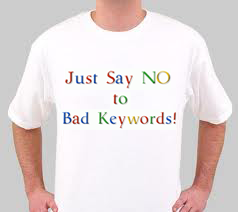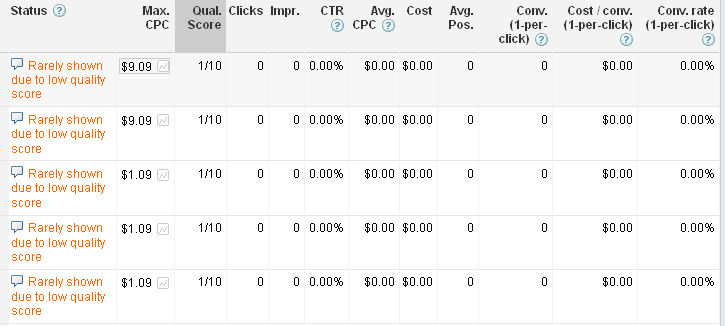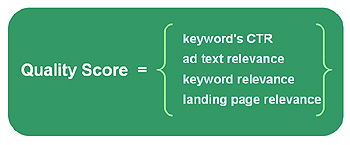 When managing an AdWords campaign, one of the most common mistakes people make is piling on too many keywords. Their assumption—that more keywords equals more chances for their ad to be shown and get clicked—seems like a logical one. However, what they fail to realize is that having too many keywords is most likely dragging their Quality Score down.
When managing an AdWords campaign, one of the most common mistakes people make is piling on too many keywords. Their assumption—that more keywords equals more chances for their ad to be shown and get clicked—seems like a logical one. However, what they fail to realize is that having too many keywords is most likely dragging their Quality Score down.
These so-called “bad keywords” are easy to spot in your AdWords campaigns by checking the Status column:

The quality and relevance of your keywords and ads are the most important factors in your campaign’s ranking and performance. An individual keyword’s Quality Score is determined by its click-through rate (CTR), relevance to its Ad Group, historical performance, and other relevancy factors. Therefore, the higher the Quality Score of your keywords, the less you pay for each click on your ad.
In this light, you can think of your Google AdWords campaign as an equation with the Quality Score being the most important part:

Google’s Quality Score is intended to ensure search users that they will find the information they are looking for quickly and easily by showing only those ads which are most relevant to their search queries.
Here’s the official explanation on Quality Scores from Google:
What is the AdWords Quality Score, and how is it calculated?
The AdWords system calculates a Quality Score for each of your keywords. It looks at a variety of factors to measure how relevant your keyword is to your ad text and to a user’s search query. A keyword’s Quality Score updates frequently and is closely related to its performance. In general, a high Quality Score means that your keyword will trigger ads in a higher position and at a lower cost-per-click (CPC).
A Quality Score is calculated every time your keyword matches a search query — that is, every time your keyword has the potential to trigger an ad. Quality Score is used in several different ways, including:
- Influencing your keywords’ actual cost-per-clicks (CPCs)
- Estimating the first page bids that you see in your account
- Determining if a keyword is eligible to enter the ad auction that occurs when a user enters a search query
- Affecting how high your ad will be ranked
Google recommends that accounts are best organized in the following way:
- One campaign
- Several tightly themed ad groups
- 10-35 relevant keywords per ad group
- 2-3 relevant ads per ad group
How do you improve the Quality Scores of your keywords?
The best way to improve your keywords’ quality scores is by optimizing your account. Here are some specific things that you can do:
- Make sure that each keyword in each ad group closely relates to the ad(s) and the landing page.
- Don’t use broad or general keywords since they tend to generate many impressions but very few clicks.
- Strive to optimize keywords with a low CTR.
- Vary the match types.
- Use keywords made up of two or three words.
- Include relevant variations (plural, singular, synonyms, misspellings, etc.).
- Get rid of low search volume keywords unless they are:
- A new product
- A competitor’s term
- Seasonal
- Event-based keywords
P.S. If you need help optimizing your AdWords campaigns for higher Google Quality Scores, we offer a full suite of PPC Campaign Management services. Give us a call at (410) 942-0488 or submit an RFP to learn how we can help.
Related posts:
- Analyze Competition: New AdWords Tool Helps Advertisers Stay Competitive
- How Keywords Affect Your Search Engine Rankings
- Your PPC & General Web Marketing Questions Answered (#7mktgsins)
- Google Beta Testing Phone Numbers in AdWords Ad Text… And We’re In On It!
6 Comments »
Leave a comment
Web Ad.vantage is a full-service online marketing company with core competencies in search engine optimization, PPC Campaign Management and online media buying. Visit our Internet Marketing Services section to learn more about our full range of services.
WebAdvantage.net encourages the reprinting of our marketing tips and articles. Before doing so, however, please contact us at for permission to do so. The company bio located above is required to accompany any reprint. Thank you in advance for your professional courtesy.
Pragmatic, professional advice with no hidden agenda.

Internet Business Forum






 back to top
back to top







Thanks for this, I’ve just started dabbling with AdWords and I have to say the Quality Score thing is something that mystifies me a bit I’ve only ever managed to get a score of between 4 and 6 despite my ads being directly related to the keyword and the landing page being stuffed with the keywords too..
Quick question though under the “How do you improve the quality scores of your keywords”.. Third bullet in the list “Strive for keywords with a low CTR”.. Did you mean strive for keywords with a low CTR (Click Through Rate)… I would imagine a low CTR to impressions would only reduce your score whereas a high CTR to impressions would suggest a relevant ad based on the keyword and therefore a better score.. or am I mis-interpreting something?
Thanks again for the guidelines though.. Useful.
Comment by Allthegearnoidea — March 23, 2011 @ 10:53 am
We clarified this as: “Strive to optimize keywords with a low CTR.” Sorry if it caused any confusion!
This article is a joke. How is it when I upload keywords of misspellings, Adwords tells me my quality score is 10/10 for stupid queries whereas the keywords I want to rank for (ie: the most competitive) are a 2/10 - 3/10?
Oh, and this is WITHOUT even having ONE AD IMPRESSION YET! How can Adwords say my quality score is 2/10 when the landing page is highly relevant, the keyword is used in the ad, the keyword IS relevant?
Quality score is a joke and everybody knows it. Adwords created this value and they control it to make themselves more money by saying your quality is low.
[...] false logic. First of all, having too many non-performing keywords in your campaign can actually bring your overall campaign down, which in turn can lead to increased expenses to generate the same [...]
Pingback by 8 Things Wrong With Your Google AdWords Campaign | zowchow.com — November 28, 2012 @ 8:53 pm
[...] is false logic. First of all, having too many non-performing keywords in your campaign can actually bring your overall campaign down, which in turn can lead to increased expenses to generate the same [...]
Pingback by 8 Things Wrong with Your Google AdWords Campaign | Latest PDAs — December 1, 2012 @ 11:48 am
[...] is false logic. First of all, having too many non-performing keywords in your campaign can actually bring your overall campaign down, which in turn can lead to increased expenses to generate the same [...]
Pingback by Transforme Communications | 8 Things Wrong with Your Google AdWords Campaign — December 7, 2012 @ 3:17 pm